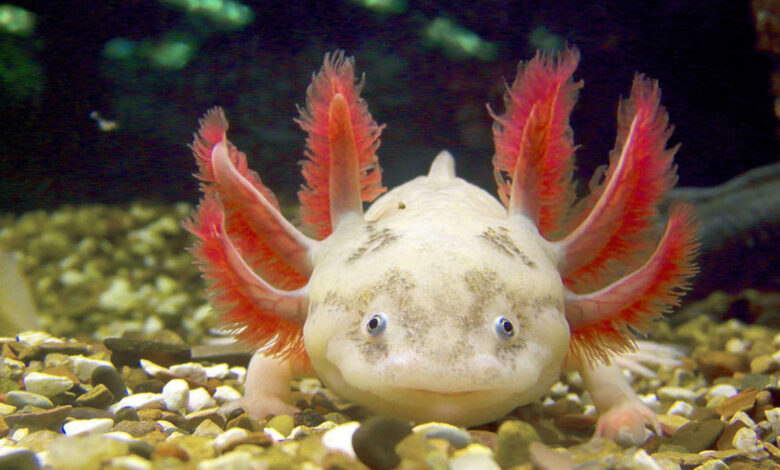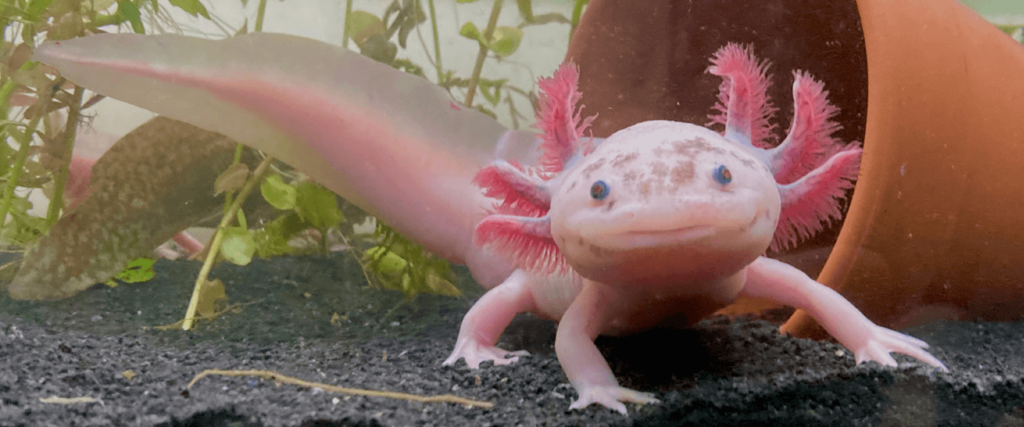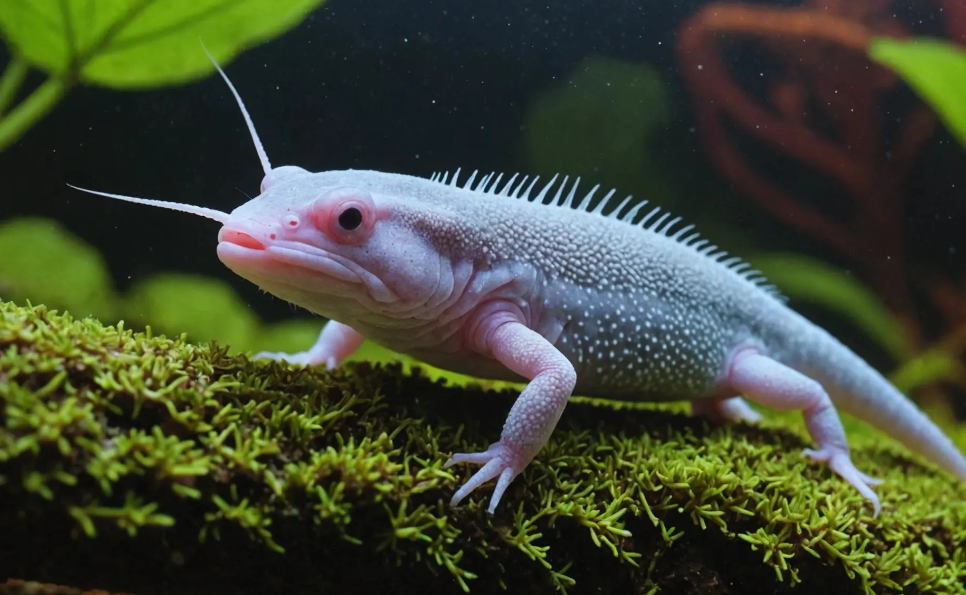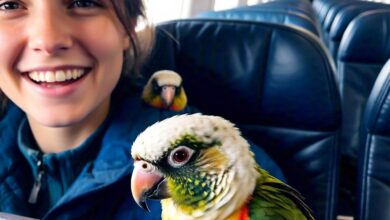Axolotl Life Expectancy: How Long Can These Fascinating Creatures Live?

Axolotl life expectancy is a topic that fascinates many pet owners and animal lovers. These cute and unique creatures can live much longer in a safe and caring environment, making them a great pet for those who are willing to put in the effort. Typically, an axolotl’s life expectancy ranges from 10 to 15 years when provided with the right care, including a balanced diet, clean water, and a stress-free habitat.
In the wild, however, their lifespan is shorter due to predators, pollution, and other environmental threats. Understanding axolotl life expectancy is key for anyone thinking about owning one, as proper care can greatly influence how long they live. In this post, we will dive deeper into factors that affect their life expectancy and offer tips on how to help your axolotl live a long, healthy life.
What is the Average Axolotl Life Expectancy?
Axolotls are fascinating creatures, and their life expectancy can vary depending on how they are cared for. In the wild, axolotls usually live for around 5 to 6 years due to environmental challenges like predators and pollution. However, when they are kept as pets, they can live much longer, often up to 10 to 15 years with proper care.
The key to a long axolotl life is providing a healthy environment. This includes clean water, the right temperature, and proper food. If you take care of these basics, your axolotl can enjoy a long and healthy life, often outliving its expected lifespan in the wild.
Factors That Affect Axolotl Life Expectancy
Several factors can impact the life expectancy of your axolotl. Here are some of the most important ones:
- Water Quality: Clean water is essential for axolotls. Dirty or polluted water can shorten their lifespan. Regular water changes are necessary to keep your axolotl healthy.
- Diet: A well-balanced diet helps your axolotl stay strong and healthy. Feeding them high-quality food, such as earthworms or pellets, is crucial for their growth and longevity.
- Temperature: Axolotls prefer cooler water temperatures, around 60-64°F (16-18°C). If the water gets too warm, it can stress them out and shorten their life.
- Health: Regular health checks are important. An axolotl that isn’t feeling well due to illness or poor water conditions is more likely to have a shorter lifespan.
By keeping these factors in mind and providing a proper care routine, you can greatly increase your axolotl’s life expectancy.
How to Care for Your Axolotl to Maximize Its Life Expectancy

Caring for your axolotl properly can help them live their best life. First, provide a spacious tank with enough space to swim freely. The tank should have a filter to keep the water clean and free from harmful toxins. Regular cleaning of the tank is a must to maintain a healthy environment.
Feeding your axolotl nutritious food also plays a big role. You can feed them a variety of foods like worms, shrimp, and fish. Be sure to avoid overfeeding, as that can lead to health problems. Also, make sure your axolotl always has access to fresh, clean water to drink and swim in.
Tank Setup Tips:
- Ensure the tank is at least 20 gallons.
- Avoid putting too many decorations in the tank, as it can stress the axolotl.
- Use a gentle filter to prevent current that might stress them out.
By following these tips and making sure your axolotl has a comfortable environment, you can help ensure it has a long and healthy life.
Axolotl Life Expectancy: Wild vs. Pet Environments
In the wild, axolotls face many dangers that shorten their life expectancy. Predators, pollution, and a lack of proper food can all affect their lifespan. In natural environments like lakes, axolotls have to deal with these threats every day, which is why they typically live only about 5 to 6 years.
As pets, however, axolotls can live much longer. When you provide them with a safe and controlled environment, their life expectancy can increase significantly. This means they can enjoy a longer, healthier life than they would in the wild, often living up to 15 years if properly cared for.
Why Pet Environments Help:
- No predators to worry about.
- Control over food and water quality.
- Safe from pollution and harmful environments.
So, if you’re planning to adopt an axolotl as a pet, rest assured that they can live a much longer and healthier life in your care.
Common Health Issues That Impact Axolotl Life Expectancy
Like all pets, axolotls are prone to certain health issues that can affect their life expectancy. If your axolotl becomes sick, it can be harder for them to live a long life. Some common health problems include fungal infections, gill rot, and stress-related conditions.
Regular checkups and keeping an eye on any unusual behavior are crucial. If you notice your axolotl isn’t eating, moving less, or showing signs of illness, it’s important to take action right away. The earlier you catch health problems, the better their chances of recovery.
Signs of Illness to Watch:
- Loss of appetite.
- Lethargy or lack of movement.
- Visible wounds or skin issues.
By staying alert and providing the proper treatment, you can ensure your axolotl remains healthy and has the best chance at a long life.
The Role of Diet in Axolotl Life Expectancy

A good diet is one of the most important aspects of increasing your axolotl’s life expectancy. In the wild, axolotls eat small aquatic animals, but in captivity, they can be fed a variety of foods like worms, shrimp, and high-quality axolotl pellets.
A proper diet helps keep their immune system strong, so they are less likely to get sick. Just like humans, if axolotls don’t eat the right foods, their health will suffer. Overfeeding can also be harmful, as it can cause obesity and other health issues, reducing their life expectancy.
What to Feed Your Axolotl:
- Earthworms and bloodworms.
- Shrimp or small fish.
- Specialized axolotl pellets.
Feeding them a balanced diet will help them live a longer, healthier life.
Conclusion
Understanding axolotl life expectancy is key to ensuring that these fascinating creatures live a long and happy life. By providing the right care, including a clean tank, healthy food, and the right water temperature, you can help your axolotl live up to 15 years or even more. Remember, axolotls need a safe and stress-free environment to thrive, so taking good care of them is very important for their overall health.
So, if you’re thinking of keeping an axolotl as a pet, just know that with the right attention, your little friend can live a long, healthy life. It’s all about giving them the proper care, being aware of their needs, and keeping an eye on their health. With some effort, you can enjoy many years with your axolotl!
FAQs
A: Axolotls can live up to 15 years if they are well taken care of, though their life expectancy is shorter in the wild.
A: Axolotls enjoy earthworms, bloodworms, shrimp, and specialized axolotl pellets for a balanced diet.
A: Axolotls prefer cooler water, ideally between 60-64°F (16-18°C). Too warm water can stress them out.
A: It’s important to change your axolotl’s water regularly—at least once a week—to keep it clean and healthy.
A: Yes, axolotls benefit from a gentle filter that keeps the water clean without creating strong currents that might stress them.

